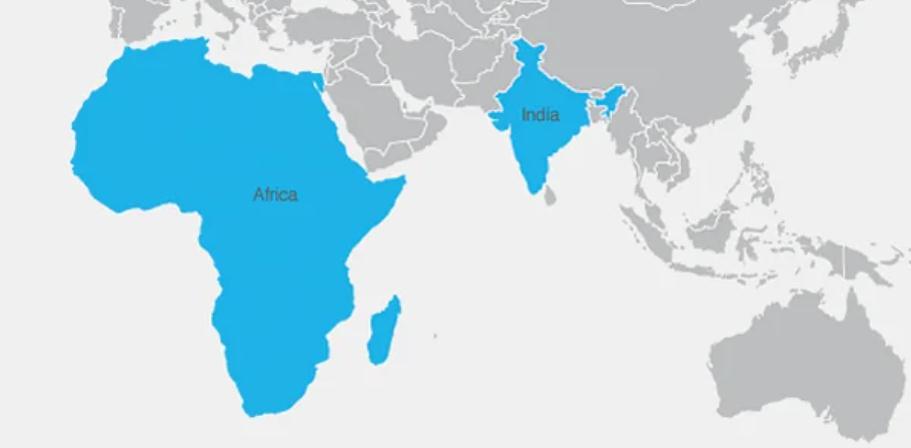The Indian Ocean Region (IOR) is a land bridge that connects Africa and India. Africa, the world’s second-largest continent, is home to 54 countries, all of which India gets along with well.

Why is the African Continent Important?
Natural Resources
The continent is enriched in mines and minerals such as diamonds, gold, platinum, and a variety of other forestry products abound in the continent, which is vital to the rest of the globe.
Human Resources
The continent is endowed with people who can toil under the scorching sun. This continent has long attracted conquerors due to its natural and human riches.
Strategic Location
The continent is strategically located between the Indian Ocean and the Atlantic Ocean.
Economic Growth
In 2019, the continent’s economic growth is expected to be 3.2 percent. According to the World Bank, it also has six of the world’s fastest-growing economies.
Impact of Afro-Asian Resurgence on International Relations
Historical
- India in Africa traces back to the pre-independence era and were bolstered throughout India’s national independence fight
- During the colonial period, Europeans discriminated against people just because of their skin colour
- Mahatma Gandhi fought for the rights of not only the Indian community but also the indigenous people of South Africa from here
- His deeds inspired not just the people of South Africa (Nelson Mandela), but also the people of Ghana (Kwame Nkrumah)
- India and the Liberation Struggle in Africa, anti-colonial, anti-racist stance, and formation and survival of contemporary values of democracy, secularism, and development have pushed India and Africa even closer together since independence
Economic
- Over the previous ten years, the Asia-Africa growth corridor has expanded by more than eightfold, making India Africa’s fourth-largest commercial partner
- In the next five years, it has the potential to triple to $150 billion
- In 2018, the bilateral commerce between the whole of the African continent and India was valued at US$ 62 billion
- The trade between Africa and China, on the other hand, is somewhat less than US$ 200 billion
Line of Credit
- India has granted a US$ 10 billion line of credit to 100 projects in 41 countries
- Initiatives involving talent development, IT development, solar energy projects, and other topics are included
- Investment: In addition to commerce, Indian investment in Africa has expanded dramatically in recent years
- India is the continent’s fifth-largest investor, with $54 billion in investments made over the last 26 years
Defence
- Defence is becoming a new area of collaboration
- In February 2020, India hosted the African Defence Ministers’ Conclave
- India has the potential to increase its defence exports to Africa
- African delegations have become more apparent at Indian defence fairs such as Defence Expo and Aero India in recent years
- At Defence Expo 2020, the defense ministers and representatives of 50 African countries signed the Lucknow Declaration with the Indian defense minister to recognize similar security problems such as terrorism, extremism, piracy, and human trafficking
Asia-Africa Growth Corridor
- The Afro-Asian Sea Corridor Growth Project, which is an alternative to the One Belt One Road programme, is being launched by India and Japan (OBOR)
- The Corridor combines India’s commitment to human resource development and capacity building with Japan’s goal of providing high-quality infrastructure in the region
Challenges
Internal Instability
Internal political unrest in some African countries may influence India’s long-term investment potential. For example, since 2013, South Sudan has been engulfed in civil violence.
Social Conflicts
Foreign contributors are hesitant to come into the region because of ethnic and religious tensions, as well as governance concerns in some nations.
Terrorism
In the last few years, terrorist assaults by Al-Qaida and ISIS-affiliated extremists have increased dramatically across Africa. To battle the threat of terrorism and maintain security and unity, India has deployed personnel and weapons in many African nations in the past and plans to do so in the future.
China Factor
In Africa, there is a rivalry between India and China. In terms of trade, China and Africa have a $220 billion trade surplus. China’s first overseas military post was in Djibouti.
There should be more connectivity and face-to-face contact, which is critical for the development of relationships. For example, random attacks against African nationals in India have been a source of worry; such instances should be treated with zero tolerance in India.
Ultimately, just as India and Africa collaborated to combat colonialism, both sides should collaborate to construct a just, representational, and egalitarian world order that grants a voice to one-third of humanity.
Conclusion
India Africa forum summit is held once in every three years and it is the official platform for the India-Africa relations. During this summit raising food and oil prices were the top concern for the Indian and African leaders.
Related Articles
 Profile
Profile Settings
Settings Refer your friends
Refer your friends Sign out
Sign out











